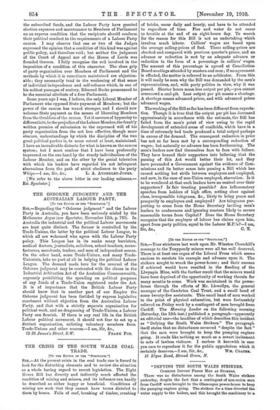THE CRISIS IN THE SOUTH WALES COAL TRADE.
[To THE EDITOR Or THE "Sr/crews."] SIR,—At the present crisis in the coal trade one is forced to look for the disturbing elements and to review the situation as a whole having regard to recent legislation. The Eight Hours Bill has directly and indirectly much affected the condition of mining and miners, and its influence can hardly be described as either happy or beneficial. Conditions of mining are such that they cannot have terms dictated to them by hours. Falls of roof, breaking of timber, crushing
of bricks, occur daily and hourly, and have to be attended to regardless of time. Fire and water do not cease to trouble at the end of an eight-hours day. To search for the reason for this Bill is not an undertaking which involves much labour. Colliers' wages are based upon the average selling-prices of fuel. These selling-prices are checked and compared with previous quarter's prices, and an advance or reduction is met by an adequate advance or reduction in the form of a percentage in colliers' wages. The amount of this percentage is agreed at Conciliation Board meetings attended by masters and men ; if no agreement is effected, the matter is referred to an arbitrator. From this it will easily be seen why the Bill was demanded by the men's representatives, and, with party politics in view, why it was passed. Shorter hours mean less output per pit,—you cannot overcrowd a coal-pit. Less output per pit means a shortage. A shortage means advanced prices, and with advanced prices advanced wages.
The working of the Bill so far has been different from expecta- tion. Though it is true that the output per pit has decreased approximately in accordance with the estimate, the Bill has failed from the men's point of view owing to the rapid development of extended areas of coalfields, which have in a time of extremely bad trade produced a total output perhaps in excess of the demand. The consequent reduction in price has not so far been met by a corresponding reduction of wages ; but naturally no advance has been forthcoming. The men's leaders now find themselves face to face with failure. They have hoaxed their supporters into believing that the passing of this Act would better their lot, and they have persuaded a Government against the evidence of Com- missions and its better sense into passing a Bill which has caused nothing but strife between employers and employed, and now, in the case of non-Union employed, starvation. Is it to be wondered at that such leaders have no control over their supporters P Is fair treating possible P Are inflammatory speeches from holders of high office, setting class against class, irresponsible telegrams, &c., likely to bring peace and prosperity to employers and employed P Are telegrams pur- porting to come from the Home Secretary inviting men's leaders to conferences and ignoring masters likely to secure reasonable terms from Capital ? Does the Home Secretary recognise that the employer of labour has claims upon him, apart from party politics, equal to the Labour M.P.'s P—I am,


































































 Previous page
Previous page